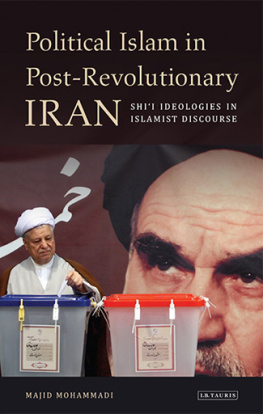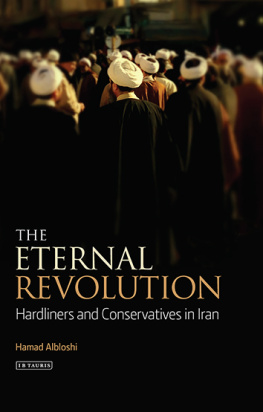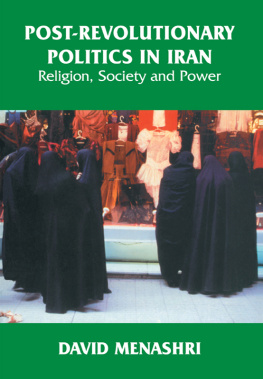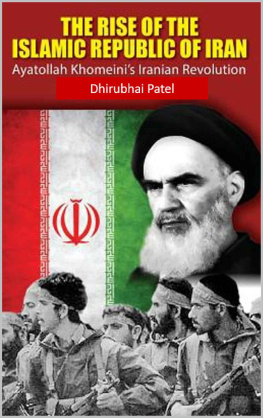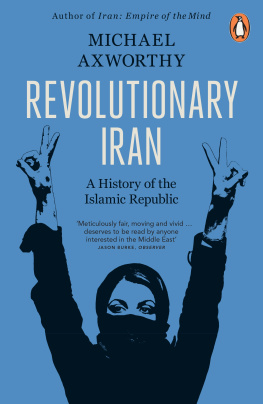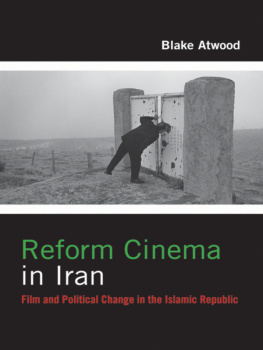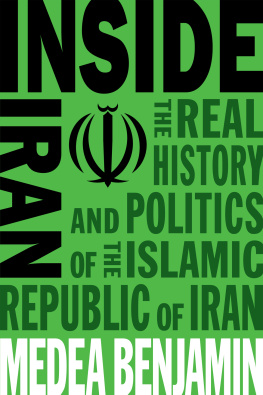Published in 2015 by
I.B.Tauris & Co. Ltd
London New York
www.ibtauris.com
Copyright 2015 Majid Mohammadi
The right of Majid Mohammadi to be identified as the author of this work has been asserted by the author in accordance with the Copyright, Designs and Patents Act 1988.
All rights reserved. Except for brief quotations in a review, this book, or any part thereof, may not be reproduced, stored in or introduced into a retrieval system, or transmitted, in any form or by any means, electronic, mechanical, photocopying, recording or otherwise, without the prior written permission of the publisher.
References to websites were correct at the time of writing.
International Library of Iran Studies 24
ISBN: 978 1 84885 276 1
eISBN: 978 0 85773 678 9
ePDF: 978 1 78673 969 8
A full CIP record for this book is available from the British Library
A full CIP record is available from the Library of Congress
Library of Congress Catalog Card Number: available
TABLES AND FIGURES
: Islamist Ideologies: Realm, Background and Representation. Source: courtesy of the author.
: Islamist Ideologies: Issues and Positions. Source: courtesy of the author.
: Shii Islamisms with Respect to Critical Public Policy Issues. Source: courtesy of the author.
: Religious Research Programs and their Specifications in Post-Revolutionary Iran. Source: courtesy of the author.
: Foundations and Institutions of Religious Research Programs in Iran, 1990s. Source: courtesy of the author.
: Sources and Main Scholars of Religious Research Programs in Post-Revolutionary Iran. Source: courtesy of the author.
: Apex of Iranian Religious Research Programs in Three Decades. Source: courtesy of the author.
PREFACE
The Islamic Republic of Iran is a unique phenomenon in the late twentieth and early twenty-first centuries. The Islamic regime is defined by its aims to enforce Islamic law and establish an Islamic state modeled on the Prophet Mohammad and Imam Ali's rule of pristine Islam. Iran is the only Shii state in the world, and it enforces as many Islamic regulations as it can. The mixture of Shii Islamism, feudalistic authoritarianism and traditional paternalism embedded in clerical values and the constitution has made the country a rare case in the modern state era. Similar to other modern states, the Iranian Islamic state has its own very specific theoretical ideology which forms the basis of its society and political system.
Islamist groups in post-revolutionary Iran are usually introduced as radical, moderate/conservative and reformist Islamist factions. In fact, the reality is somewhat more nuanced. Having read media analyses and the academic literature on ideological developments in Iran, I have come to the conclusion that without understanding the diversity of ideologies, their contextual discourses, and the social and political groups that cling to them, it is impossible to grasp the dynamics of internal politics in Iran. The goal is not to find and foster a third way, but to open a conversation and to study the diversity of Islamist ideologies, even in a very small section of the Islamic world, and the way that they act and interact in contemporary Iranian politics. In this book, I seek to demonstrate how Iranian clerics, religious and secular intellectuals, and political theoreticians and activists have responded to the cultural, political and social transformations within their society from the end of 1970s to the late 2000s.
By delving into the theory and practice of Iranian Shii Islamisms at work, this study is intended to provide information and analysis of an ongoing project of Islamism and Islamicization in Iran, and implicitly argues for a more measured and far-sighted reaction to this phenomenon. Analyzing the response and critique to which these ideologies have given rise, the task is to locate the ideological formation, articulation and reformation of Islamism in the framework of the Islamic Republic of Iran. How do Islamist ideologies function within the context of the Islamic regime? This study will provide some information and analyses for researchers and scholars who seek a broader view of Islamist political thinking and the relationship between various stages of its development.
Islamist literature consists mostly of statements and counter-statements, prayer lectures, rhetoric, polemic and newspaper commentary. My work aims to extract the main ideas and foundational theories of each Shii ideology from these sources. Although the Islamists' internal debates and inquiries may not offer the basic premises and discourse of Islamist ideologies, they highlight some critical aspects of Islamist discourse and the foundations and differences of each ideology compared to others. The focus is not on the failures and successes of Islamist ideologies in this work. I have instead tried to use a historical, comparative, and critical approach to study the phenomenon of development in Shii Islamic thought in the post-Iranian revolutionary era. This study therefore stands somewhere between political sociology, political theology, religious studies, and the history of ideas and ideologies.
I refer to Islamism as a modern political ideology that presents a sustained and systematic program, reflects concerns and benefits of a specific social class, proposes a certain set of changes in a society and the way of their implementation, and offers a way of approaching and controlling state power. It also provides the base for political actions, programs for political parties, and the required apparatus for a state to rule. In spite of its diversity and heterogeneity, most of the Islamism brands call for people to live in states which are governed by a monolithic reading of Islam, whether Islamic shariah or Islamic values and norms.
Presumptions
Three points are presumed in this study: 1) the sociality (ejtemiyyat), secularity (orfiyyat), politicality (sisiyyat) and historicity (trikhiyyat) of religion in general and Islam in particular, 2) the interaction among law, religion, ethics, society and politics as independent areas of a community life, and 3) the heterogeneity and inconsistency of Islam as a historical entity. As a sociologist I regard religions including Islam as historical entities; as social and political scientists we do not have anything concrete other than the history of these religions. All religions that we know today have been interacting with other institutions and have influenced and been influenced in this process.
There is not any one Islam, Islam; there are Twelver Shii Islams. Each branch and sect of Islam is divided into different cultural, political, ideological and geographical forms from North Africa to South East Asia, similar to Christianity in different parts of the world. For this reason, I will relate the ideologies I examine to their political and socio-economic contexts.
The authoritarian claim to orthodoxy and authority in the framework of Islam is to assert what Islam is and exclusively explain its roots, while there are different Islams, and their roots could be traced to despotic political cultures and relations of power in Iran and other parts of the world. The ideas, concepts, statements and actions of Islamist ideologies are determined in relation to social and political conditions such as institutional structures and power relations in each Muslim society. Orthodoxy and originality in this context only mean having been developed in different and specific communities, polities and cultures.

